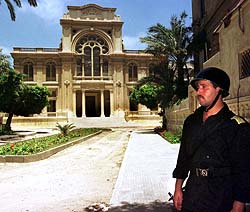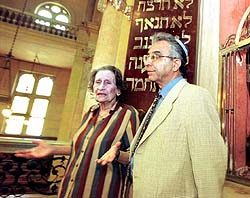Egyptian Jews feel at home in Alexandria
Community struggles to survive but retains traditions
ALEXANDRIA, Egypt (AP)
-- The elderly woman sinks onto a seat next to a brass plaque bearing the name of her dead husband. With a faraway look in her eyes, she scans the rows and rows of wooden benches in the vast synagogue, where hundreds of nameplates memorialize the Jewish community that once thrived in this Mediterranean city.
Lina Mattatia, in her mid-70s, is one of fewer than 50 Jews remaining in Alexandria, where they were once a 50,000-strong community with businesses, synagogues, a school and friendly relations with their Muslim neighbours. Some left after the creation of Israel in 1948, others were expelled during the 1956 Suez crisis and nationalization programs of the '50s and '60s and many of those remaining fled in the hostile climate of the 1967 Mideast War.
Other Jews are scattered in Egypt, with the other significant community a group in Cairo of about the same numbers as Alexandria's.
Most of those who chose to stay are now in their 70s and 80s. Their school is closed. Their one remaining synagogue sits empty most of the year because they no longer have enough men to hold regular services -- 10 are needed for a prayer group, but this community has only four or five. They do not have access to kosher food. The grounds of the Eliyahu Hanavi synagogue are heavily guarded by armed soldiers, and visitors are subjected to exacting searches of bags and pockets.
Still, the Jews say they are at home in this city of four million people, mostly Muslims.
"It is not difficult to keep our traditions," Mattatia said. "We don't feel anything against us. The neighbours are very nice. We have friends. We do our own thing."
But the Alexandria native admitted: "If I had children, I would go with them."
Victor Meir Balassiano, 61, is the father of Alexandria's only Jewish family with children. The youngest of his three children, a son, is 17 and studying in Israel; his two daughters, 19 and 21, work here.
"When everyone was leaving and I got married, others begged me to stay here to start my family. My brothers and uncles left, but I stayed behind," he said.
Balassiano is glad he stayed in his country, but acknowledged he plans to move to Israel within the next few years, mostly for his children, who he believes will be denied opportunities in Egypt because they are Jewish.
"I don't think I could find a job if I didn't work at the synagogue," he said. "My son will not be able to find a job or a wife here. We must leave."
After decades of tension and four wars, Egypt and Israel signed a peace treaty in 1979, but relations are far from normal. Egyptian professional groups ban their members from contacts with the Jewish state.
But "Muslims are very tolerant of us," said Meir Mishan, the Israeli consul-general in Alexandria. "We have no problems."
So why the tight security around Jewish buildings?
"We just have to be careful," Mishan said.
Jews have lived in Alexandria since soon after the city's founding in 331 BC. Encouraged by Alexander the Great, they came in great numbers, at one point making up at least one-fourth of the city's population. The city faltered over the centuries, but was rebuilt in the 1800s, and the Jews returned, adding their active community to the large foreign population.
The 150-year-old Eliyahu Hanavi Sephardic synagogue offers a glimpse of what the Jewish community was like in its prime. The magnificent building, one of the largest synagogues in the Middle East, boasts towering Italian marble columns and seating for over 700 people. The brass nameplates marked the regular seats of its male patrons, with extra seating upstairs for the women. A closed chamber at the front of the building holds about 30 Torah scrolls, collected from the city's other synagogues when they closed.

An Egyptian armed soldier guards the 150-year-old Eliyahu Hanavi synagogue in the Mediterranean city of Alexandria, Egypt. The 150-year-old Eliyahu Hanavi Sephardic synagogue offers a glimpse of what the Jewish community was like in its prime. The magnificent building, one of the largest synagogues in the Middle East, boasts towering Italian marble columns and seating for over 700 people. (AP Photo, Amr Nabil)
Now the synagogue sits empty, sometimes visited by a member lighting candles of remembrance, rarely entered by a tourist wandering past on the busy street. Twice a year, on the Jewish holidays of Passover and Rosh Hashanah, a small delegation travels from Israel to provide the necessary male contingent for religious services and to deliver kosher food.
The president of Alexandria's Jewish Community, Joe Harari, 85, said he has bid goodbye too many times over the years.
"Too many people left for other countries," he said. "I am Jewish, but I am also Egyptian. I'm 100 per cent satisfied and happy here. Why would I leave?"
Harari is typical of his dwindling community. Strong-willed enough to stay in Egypt even after the exodus of relatives and friends, the few remaining Jews live out their years wrapped in their community, subsisting mainly on the rental income of the school and other small buildings on the synagogue's property to businesses and some residents.
In the empty courtyard, Balassiano looks up at the four-storey school where he was once a student and a teacher, remembering when the classrooms were full of children studying Hebrew and the courtyard rang with laughter.
"I am sad that everyone has gone, but what can I do?" he asked. "It's a memory for me, a souvenir."

